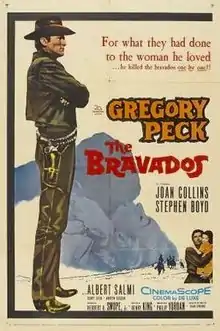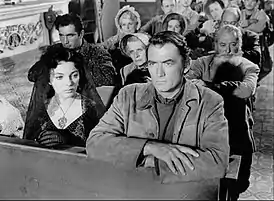The Bravados
The Bravados is a 1958 American western film (color by DeLuxe) directed by Henry King, starring Gregory Peck and Joan Collins. The CinemaScope film was based on a novel of the same name, written by Frank O'Rourke.[1]
| The Bravados | |
|---|---|
 Theatrical release poster | |
| Directed by | Henry King |
| Produced by | Herbert B. Swope Jr. |
| Screenplay by | Philip Yordan |
| Story by | Frank O'Rourke |
| Starring | Gregory Peck Joan Collins |
| Music by | Alfred Newman Hugo Friedhofer Lionel Newman |
| Cinematography | Leon Shamroy |
| Edited by | William Mace |
| Distributed by | 20th Century Fox |
Release date |
|
Running time | 98 minutes |
| Country | United States |
| Language | English |
Plot

Jim Douglass (Gregory Peck) is a rancher pursuing four outlaws he is convinced murdered his wife six months before. He rides into Rio Arriba, where these four men, Alfonso Parral (Lee Van Cleef), Bill Zachary (Stephen Boyd), Ed Taylor (Albert Salmi) and Lujan (Henry Silva), are in jail awaiting execution for an unrelated murder. Sheriff Eloy Sanchez (Herbert Rudley) allows Douglass to see the men.
In town, Douglass happens upon Josefa Velarde (Joan Collins), whom he met and fell in love with nearly five years previously in New Orleans. She has been looking after her late father's ranch and has never married. Douglass reveals that he did marry, is now a widower, and that he has a daughter (Maria Garcia Fletcher). Josefa later learns, from Rio Arriba's priest (Andrew Duggan), the truth of how Douglass' wife died.
Simms, the executioner, arrives. He waits until the townspeople are at church, then while pretending to check the men's height and weight, stabs the sheriff in the back. The sheriff manages to shoot and kill him, but the inmates escape and take a young woman named Emma as a hostage. A posse rides out immediately, but Douglass - with his extensive experience trailing these outlaws - waits until morning; he anticipates one of the prisoners will stay behind to cut off everybody at a pass, which is what happens. Douglass eventually catches up. The posse finds a dead man, who appears to be the real Simms.
The outlaws determine that Douglass is the man they must worry about most. Parral is assigned the job of ambushing him. Instead, Douglass takes him from behind. Parall begs for his life and insists, when Douglass shows him a photo of his wife, that he has never seen the woman. Douglass kills him, then sets out after the other three. Taylor hangs back, figuring he can take Douglass down. Douglass, however, evades his fire, then ropes him by the feet and hangs him upside-down from a tree.
The two remaining fugitives reach the house of John Butler (Gene Evans), a prospector and Douglass' neighbor. Butler tells the men he needs to get to work outside and leaves, in actuality attempting to escape. Zachary shoots and kills him; Lujan goes to retrieve a sack of coins which Butler had taken with him. While Lujan is doing this, Zachary rapes Emma. Lujan sees riders approaching, calls to Zachary, and they flee, leaving the girl behind. The riders turn out to be Josefa and one of her ranch-hands, who now spot Douglass coming toward them from another direction. The posse also arrives and Emma's father and fiancé find Emma.
Douglass goes to his ranch to get fresh mounts, but finds that the fugitives have taken his last horses. He leaves Josefa with his daughter. In a town just across the Mexican border, Douglass enters a bar and finds Zachary. The outlaw claims to not know the woman in the picture Douglass shows him and shouts at him to let him be. Douglass draws his gun, Zachary pulls his, and Douglass shoots him dead. He then goes on to the home of the fourth man, Lujan, who has a family of his own. When shown a photo of Douglass's wife, Lujan says he has never seen the woman before. He recalls that he and his companions had ridden past the ranch. Douglass points to Lujan's sack of coins and tells him that whoever killed his wife stole that from his ranch. Lujan explains that he took the bag from Butler, whereupon Douglass realizes that Butler was the murderer.
Now knowing that the four men whom he pursued had nothing to do with his wife's death, Douglass realizes that he is no better than they were, having killed three of them in cold blood. He returns to town and goes to the church to ask for forgiveness. The priest says that while he cannot condone Douglass' actions, he respects him for not making excuses for what he has done. Josefa arrives with Douglass' daughter, and they exit the church together.
Cast
- Gregory Peck as Jim Douglass
- Joan Collins as Josefa Velarde
- Stephen Boyd as Bill Zachary
- Albert Salmi as Ed Taylor
- Henry Silva as Lujan
- Kathleen Gallant as Emma Steimmetz
- Barry Coe as Tom
- George Voskovec as Gus Steinmetz
- Herbert Rudley as Sheriff Eloy Sanchez
- Lee Van Cleef as Alfonso Parral
- Andrew Duggan as Padre
- Ken Scott as Primo, Deputy Sheriff
- Gene Evans as Butler
- Joe DeRita as Simms' impostor
- Jason Wingreen as Nichols
- Ada Carrasco as Mrs. Parral
The film is notable for including a rare serious role for Joe DeRita who, around the time the film was released, became "Curly Joe" of the Three Stooges.
Reception
Critical response
When the film was released The New York Times film critic, A. H. Weiler, gave it a positive review, writing, "Despite these flaws, which are fundamentally minor deficiencies, The Bravados emerges as a credit to its makers. Director Henry King, who headed the troupe that journeyed down to the photogenic areas of Mexico's Michoacán and Jalisco provinces, has seen to it that his cast and story move at an unflagging pace...The canyons, towering mountains, forests and waterfalls of the natural locales used, make picturesque material for the color cameras. But the producers have given their essentially grim 'chase' equally colorful and arresting treatment."[2]
On review aggregator website Rotten Tomatoes, the film holds an approval rating of 100% based on 5 critic reviews with an average rating of 8/10.[3]
Awards and nominations
| Award | Category | Nominee(s) | Result |
|---|---|---|---|
| Laurel Awards | Top Action Performance | Gregory Peck | Nominated |
| National Board of Review Awards | Best Supporting Actor | Albert Salmi (also for The Brothers Karamazov) | Won |
See also
References
- The Bravados at IMDb
- Weiler, A.H. The New York Times, film review, June 26, 1958. Last accessed: February 23, 2011.
- "The Bravados (1958)". Rotten Tomatoes. Fandango Media. Retrieved April 23, 2019.
External links
| Wikimedia Commons has media related to The Bravados (film). |
- The Bravados at IMDb

- The Bravados at AllMovie

- The Bravados at the TCM Movie Database

- The Bravados film trailer at ReelzChannel